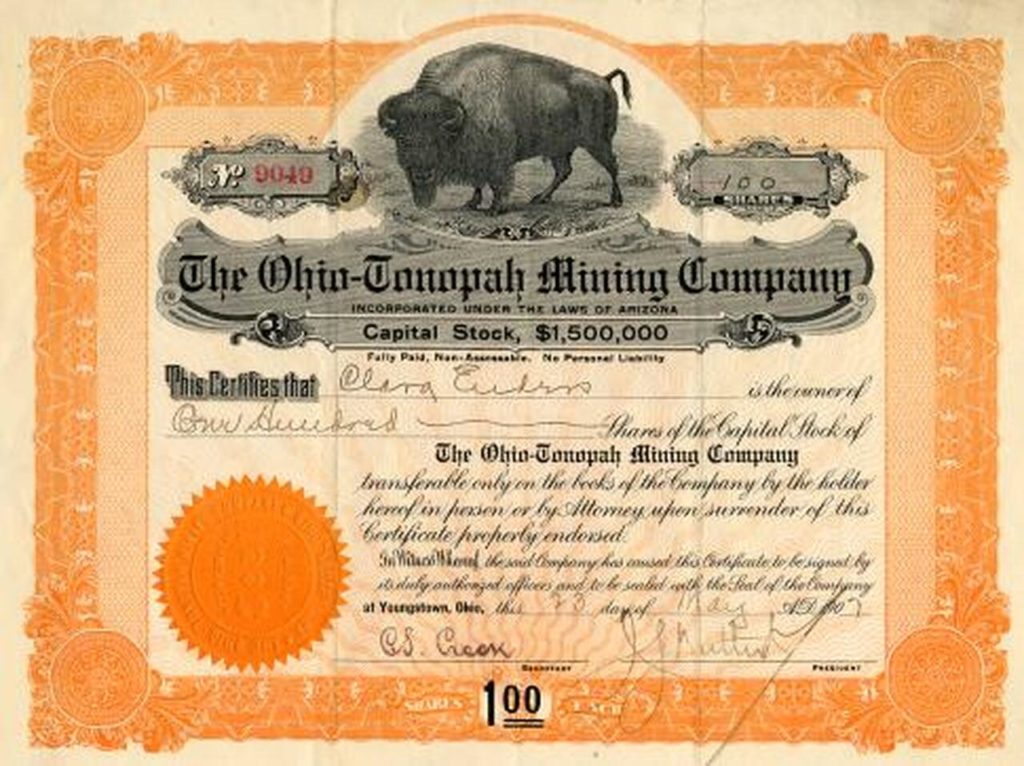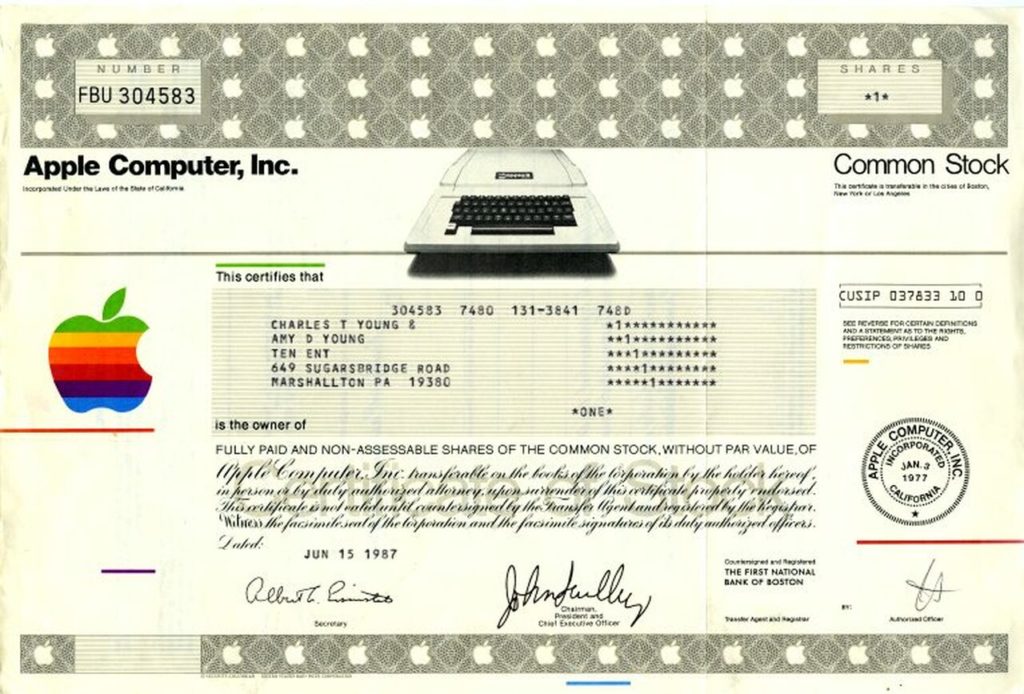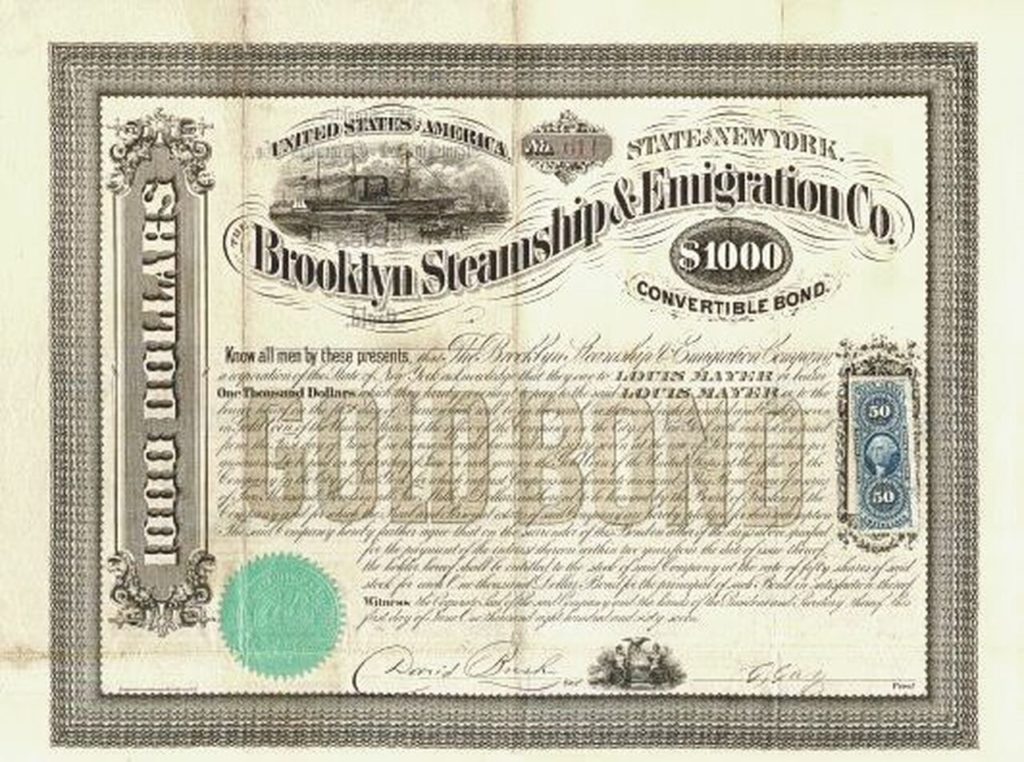Vintage stock certificates make great graduation, holiday gifts
All images courtesy of Scripophily.com
What do you get for the guy/gal/friend/loved one/coworker who has everything? A conversation piece, of course.
There are a lot of dealers’ websites that I visit regularly, just to see the new stuff on offer. One that I never tire of perusing is Scripophily.com, the premier seller of vintage and even recent stock certificates and bond—“business paper” that has become nearly obsolete in this age of online trading. I love the steel engravings and the fountain pen autographs on many of the older documents; I love the typography; I love the fact that they absolutely reek of history: I can almost smell the cigar smoke of Gilded Age boardrooms, almost hear the leather armchairs creak under the weight of freewheeling tycoons and steely-eyed investors, earnest entrepreneurs and cheapjack con men . . .

But that’s just me: lots of people buy a stock certificate for genealogical reasons—their ancestors may have owned or worked for the company—as an expression of a brand preference, or because it connects with another collect passion: gun collectors, for example, would probably love old shares in firearm companies to hang in their man caves; for movie buffs, there are certificates for motion picture studios and film labs old and new; and model railroaders will get a blast from shares in the Lionel Corporation, not to mention any of a slew of historic lines. Some folks even see offbeat humor in hanging or giving a certificate for a notorious business or one touched by scandal: like Worldcom or even Martha Stewart Living.
Scripophily.com’s president, former Northwest resident Bob Kerstein, a CPA since 1978, has been chief financial officer of companies like McCaw Cellular Corporation (now AT&T Wireless), Falcon Cable TV and American Mobile Satellite Corporation, director of financial reporting at Warner Brothers, and chief information officer at Orca Bay Sports and Entertainment, owners of the Vancouver Canucks and the Vancouver Grizzlies (before the latter went to Memphis), so he knows his onions about big business. In fact, Kerstein doesn’t just sell old stock and bond certificates but autographs, antique documents, early currency, and other interesting items; he also provides stock research services, so if you’re up in the attic and come across a bunch of shares in the bottom of Granny’s old trunk, Bob can tell you if they’re still redeemable.

Here’s a quick selection in a pretty wide price range that I pulled from the Scripophily.com website:
For the Civil War collector: a $1,000 bond from 1865 for the payment of bounties to volunteers from New York State ($149.95); an 1865 check signed by Medal of Honor winner John Hartranft ($175); an 1861 Confederate bond for $100 issued in Montgomery, Alabama, before the capital of the Confederacy was moved to Richmond, Virginia ($129.95).
For the transportation collector: an unissued 1950s certificate for the Cessna Aircraft Company ($495); a 50-by-40-inch UK/Canadian enlistment poster from 1915 entreating men to “REMEMBER THE LUSITANIA!” after the ship was sunk by a U-boat ($695); one hundred shares in the Chicago Terminal Transfer Railroad Company, issued to robber baron E. H. Harriman and signed by him.
For the gearhead: a 1924 certificate for ten shares in theDuesenberg Automobile & Motors Co.($395); various Packard Motor Car Company certificates dating from the 1920s to the 1950s ($24.95 to $395); twenty shares in the Yellow Cab Company of Baltimore from 1915 ($139.95).
For the Northwest collector: a 1907 $500 gold bond certificate for the Mount Hood Railroad Company, signed by trustee Matthew S. Browning of the Browning Arms Company and with a great steam locomotive/horse-drawn wagon vignette ($139.95); an 1890 certificate for 10 shares in the Grays Harbor Company (to finance the building of roads and the laying of rails, including the cost of bridges over the Wishkah and Hoquiam rivers), hand signed by the company’s president and secretary, and with a great vignette of a steamship ($395); a 1910 certificate for 20 shares in the Seattle–Tacoma Short Line with a great Mount Rainier vignette and also signed by the company’s president and secretary ($69.95).
For kids of all ages: a single share in DreamWorks Animation SKG from 2009 with Shrek’s face on it($79.95); a rare specimen gold bond certificate for $500 from the Hershey Chocolate Corporation dated 1920 ($395); an unissued circa-1960 specimen certificate for Wurlitzer Company, maker of the famous jukeboxes ($99.95); a bank check issued by Buffalo Bill’s Wild West and Pawnee Bill’s Great Far East show, dated 1912 and signed by Gordon W. Lillie (“Pawnee Bill”) himself ($395).

Scripophily.com offers custom framing, too, for the perfect presentation. Browse the inventory at www.Scripophily.com.
